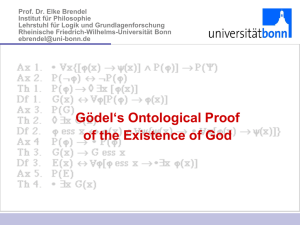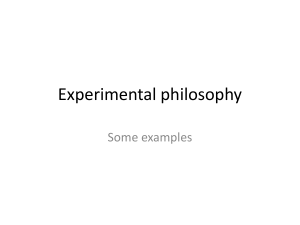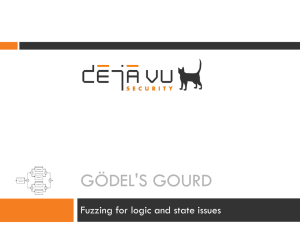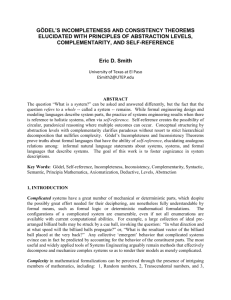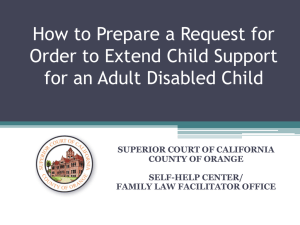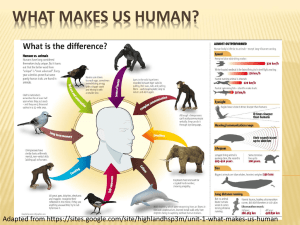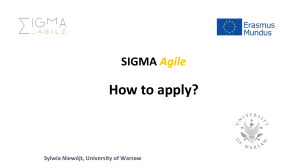Slides - University of Virginia
advertisement
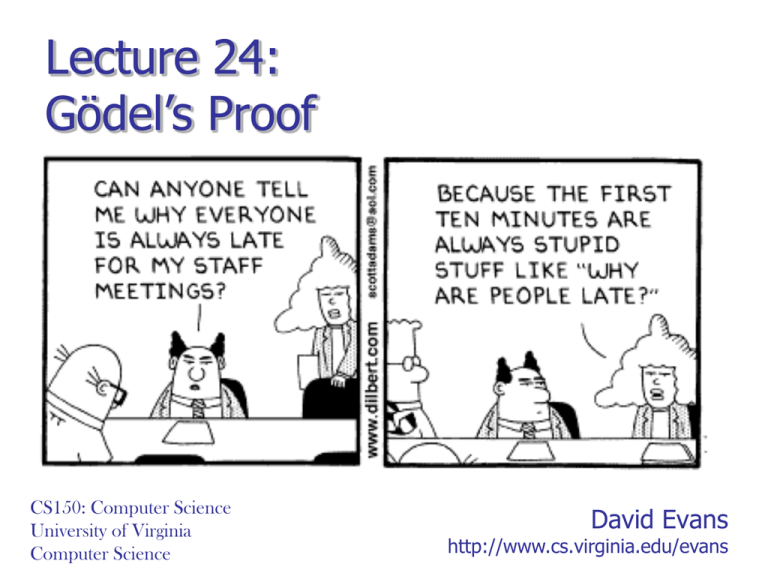
Lecture 24:
Gödel’s Proof
CS150: Computer Science
University of Virginia
Computer Science
David Evans
http://www.cs.virginia.edu/evans
PS6 Classes
sim-object
physical-object
Are there class
hierarchies like this
in the “real world”
or just in fictional
worlds like
Charlottansville?
mobile-object
thing
person
student police-officer
Lecture 24: Gödel’s Proof
place
2
Microsoft Foundation Classes
CButton inherits from CWnd inherits from CObject
“A button is a kind of window is a kind of object”
Lecture 24: Gödel’s Proof
3
Node
PathInterpolator
Interpolator
Behavior
RotationPathInterpolator
Leaf
Object
SceneGraphObject
Not at all uncommon to have
class hierarchies like this!
Java 3D Class Hierarchy Diagram
http://java.sun.com/products/java-media/3D/collateral/j3dclass.html
Lecture 24: Gödel’s Proof
4
Quiz?
http://www.cs.virginia.edu/forums/viewtopic.php?t=1651
Lecture 24: Gödel’s Proof
5
Story So Far
• Much of the course so far:
– Getting comfortable with recursive definitions
– Learning to write a program to do (almost)
anything (PS1-4)
– Learning more elegant ways of programming
(PS5-6)
• This Week:
– Getting un-comfortable with recursive definitions
– Understanding why there are some things no
program can do!
Lecture 24: Gödel’s Proof
6
Wednesday
• Computer Science (Imperative Knowledge)
– Are there (well-defined) problems that
cannot be solved by any procedure?
Today
Computer Science/Mathematics
• Mathematics (Declarative Knowledge)
– Are there true conjectures that cannot
be the shown using any proof?
Lecture 24: Gödel’s Proof
7
Mechanical Reasoning
Aristotle (~350BC): Organon
Codify logical deduction with rules of inference
(syllogisms)
Every A is a P
X is an A
X is a P
Every human is mortal.
Gödel is human.
Gödel is mortal.
Lecture 24: Gödel’s Proof
8
Premises
Conclusion
More Mechanical Reasoning
• Euclid (~300BC): Elements
– We can reduce geometry to a few axioms and
derive the rest by following rules
• Newton (1687): Philosophiæ Naturalis
Principia Mathematica
– We can reduce the motion of objects
(including planets) to following axioms (laws)
mechanically
Lecture 24: Gödel’s Proof
9
Mechanical Reasoning
• Late 1800s – many mathematicians
working on codifying “laws of reasoning”
– George Boole, Laws of Thought
– Augustus De Morgan
• Whitehead and Russell, 1911-1913
– Principia Mathematica
– Attempted to formalize all mathematical
knowledge about numbers and sets
Lecture 24: Gödel’s Proof
10
All true statements
about numbers
Lecture 24: Gödel’s Proof
11
Perfect Axiomatic System
Derives all true
statements, and no false
statements starting from a
finite number of axioms
and following mechanical
inference rules.
Lecture 24: Gödel’s Proof
12
Incomplete Axiomatic System
incomplete
Derives
some, but not all true
statements, and no false
statements starting from a
finite number of axioms
and following mechanical
inference rules.
Lecture 24: Gödel’s Proof
13
Inconsistent Axiomatic System
Derives
all true
statements, and some false
statements starting from a
finite number of axioms
and following mechanical
inference rules.
some false
statements
Lecture 24: Gödel’s Proof
14
Principia Mathematica
• Whitehead and Russell (1910– 1913)
– Three Volumes, 2000 pages
• Attempted to axiomatize mathematical
reasoning
– Define mathematical entities (like numbers)
using logic
– Derive mathematical “truths” by following
mechanical rules of inference
– Claimed to be complete and consistent
• All true theorems could be derived
• No falsehoods could be derived
Lecture 24: Gödel’s Proof
15
Russell’s Paradox
• Some sets are not members of themselves
– set of all Jeffersonians
• Some sets are members of themselves
– set of all things that are non-Jeffersonian
• S = the set of all sets that are not
members of themselves
• Is S a member of itself?
Lecture 24: Gödel’s Proof
16
Russell’s Paradox
• S = set of all sets that are not members of
themselves
• Is S a member of itself?
– If S is an element of S, then S is a member
of itself and should not be in S.
– If S is not an element of S, then S is not a
member of itself, and should be in S.
Lecture 24: Gödel’s Proof
17
Ban Self-Reference?
• Principia Mathematica attempted to
resolve this paragraph by banning selfreference
• Every set has a type
– The lowest type of set can contain only
“objects”, not “sets”
– The next type of set can contain objects and
sets of objects, but not sets of sets
Lecture 24: Gödel’s Proof
18
Russell’s Resolution?
Set ::= Setn
Set0 ::= { x | x is an Object }
Setn ::= { x | x is an Object or a Setn - 1 }
S: Setn
Is S a member of itself?
No, it is a Setn so, it can’t be a member of a Setn
Lecture 24: Gödel’s Proof
19
Epimenides Paradox
Epidenides (a Cretan):
“All Cretans are liars.”
Equivalently:
“This statement is false.”
Russell’s types can help with the
set paradox, but not with these.
Lecture 24: Gödel’s Proof
20
Gödel’s Solution
All consistent axiomatic formulations of
number theory include undecidable
propositions.
(GEB, p. 17)
undecidable – cannot be proven either true
or false inside the system.
Lecture 24: Gödel’s Proof
21
Kurt Gödel
• Born 1906 in Brno (now
Czech Republic, then
Austria-Hungary)
• 1931: publishes Über
formal unentscheidbare
Sätze der Principia
Mathematica und
verwandter Systeme (On
Formally Undecidable Propositions of
Principia Mathematica and Related
Systems)
Lecture 24: Gödel’s Proof
22
• 1939: flees Vienna
• Institute for
Advanced Study,
Princeton
• Died in 1978 –
convinced
everything was
poisoned and
refused to eat
Lecture 24: Gödel’s Proof
23
Gödel’s Theorem
In the Principia Mathematica system,
there are statements that cannot
be proven either true or false.
Lecture 24: Gödel’s Proof
24
Gödel’s Theorem
In any interesting rigid system,
there are statements that cannot
be proven either true or false.
Lecture 24: Gödel’s Proof
25
Gödel’s Theorem
All logical systems of any
complexity are incomplete: there
are statements that are true that
cannot be proven within the
system.
Lecture 24: Gödel’s Proof
26
Proof – General Idea
• Theorem: In the Principia
Mathematica system, there are
statements that cannot be
proven either true or false.
• Proof: Find such a statement
Lecture 24: Gödel’s Proof
27
Gödel’s Statement
G:
This statement does not
have any proof in the
system of Principia
Mathematica.
G is unprovable, but true!
Lecture 24: Gödel’s Proof
28
Gödel’s Proof Idea
G: This statement does not have any
proof in the system of PM.
If G is provable, PM would be inconsistent.
If G is unprovable, PM would be incomplete.
Thus, PM cannot be complete and
consistent!
Lecture 24: Gödel’s Proof
29
Charge
• Wednesday:
– Finish the proof: show we can express G
– What is the equivalent to the Gödel sentence for
computation?
• Friday:
– How to prove a problem has no solving
procedure
• Next Monday:
– History of Object-Oriented Programming
Lecture 24: Gödel’s Proof
30
